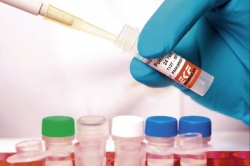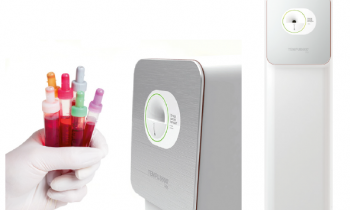The PointMan cometh
Daniela Zimmermann met with the firm’s Product Manager for Molecular Biology Gary Dowthwaite to hear more about the project PointMan
Founded in Germany 25 years ago, EKF Diagnostics’ PLC HQ is currently in Cardiff, Wales, where the firm is pursuing the development of a molecular assay for specific cancer types.

‘PointMan is a molecular assay for mutations associated with specific cancer types: KRAS codon 12/13/61, which is associated with colorectal cancer; BRAF associated with melanoma, and EGFR mutations associated with lung cancer. That is the target market,’ explained Gary Dowthwaite of EKF Diagnostics, who went on to explain the complexities in the way the assay works.
‘There are two sets of primers and one, the wild type primer, incorporates a blocking entity. There are also two flanking primers. In a tumour biopsy there will be both wild type and mutations within that heterogeneous sample. When wild type DNA template is present, the wild type primers will anneal and extend on that wild type DNA. That reaction will also incorporate a blocking entity, which prevents daughter templates from acting as templates for further rounds of the amplification – so there is only linear amplification of wild type DNA.
‘In the variant, where a point mutation is present, leads to a three prime mismatch with the wild type primers. This mismatch allows variant or flanking primers, to anneal, extend and displace the wild type primers. ‘As there is no blocking entity, the reaction can proceed, yielding exponential amplification out of your variant. Therefore, what you are getting are lots and lots of the variant at the expense of a wild type. That makes the assay incredibly sensitive, and again that sensitivity is down to 0.001%. That is in orders of magnitude better than the current technology that’s out there.’
When would this be used in a hospital?
‘At present this would be used as a diagnostic at the time of the initial diagnosis for the cancer.
‘That sensitivity is important; we hypothesise that you could use this as a blood assay to monitor patients who have cancer and are undergoing treatment. We have some proof of concept that you can use this assay to detect mutations in blood for cancer patients.’
‘The idea is, once a patient is on a particular medication regime, you can ask have they become sensitive to that? Has their mutation status changed to reflect that sensitivity or insensitivity to that particular medication?’
A big point: The medication is extremely expensive so it helps to know whether it works or not – quite soon.
‘Yes. For example, with the EGFR T790M in lung cancer, this mutation often isn’t present at diagnosis, but it becomes apparent as the treatment progresses; so, the sooner you can spot the T790M, which is becoming exposed in the tumour, the sooner you can change of course the patient’s medication.
‘That is what we have been doing with Swansea University, at the Institute of Life Sciences. They took melanoma samples from the Wales Cancer Bank and they tested those samples for the BRAF gene. From the formalin fixed tissue sample they could confirm the BRAF status.
‘We also have blood from the same patient and can detect that same mutation in the blood. That’s a proof of concept, that you can use PointMan in a liquid biopsy; it has potential for a blood assay for cancers.
‘Swansea has also looked at endometrial cancer and, again, the same thing: they looked at the tissue biopsy and then the same patient’s blood, confirming the mutation status from the block to the blood. To expand this clinical work with endometrial cancer, EKF are sponsoring a master’s studentship for 12 months. We are really quite excited about this.
The time it takes for a result from PointMan depends on the qPCR machine used, he explained. ‘Ultimately it takes about two hours, which is good.’
When asked to see the device, he explained that there is no device. ‘It’s just tubes. Tubes with different coloured caps for different mutations encountered in different cancer types.’
This is a fluid. EKF supply the PointMan kits as consumables (primer sets, Taq, mastermix and controls), which can be run on industry standard qPCR instruments.’
04.09.2014











